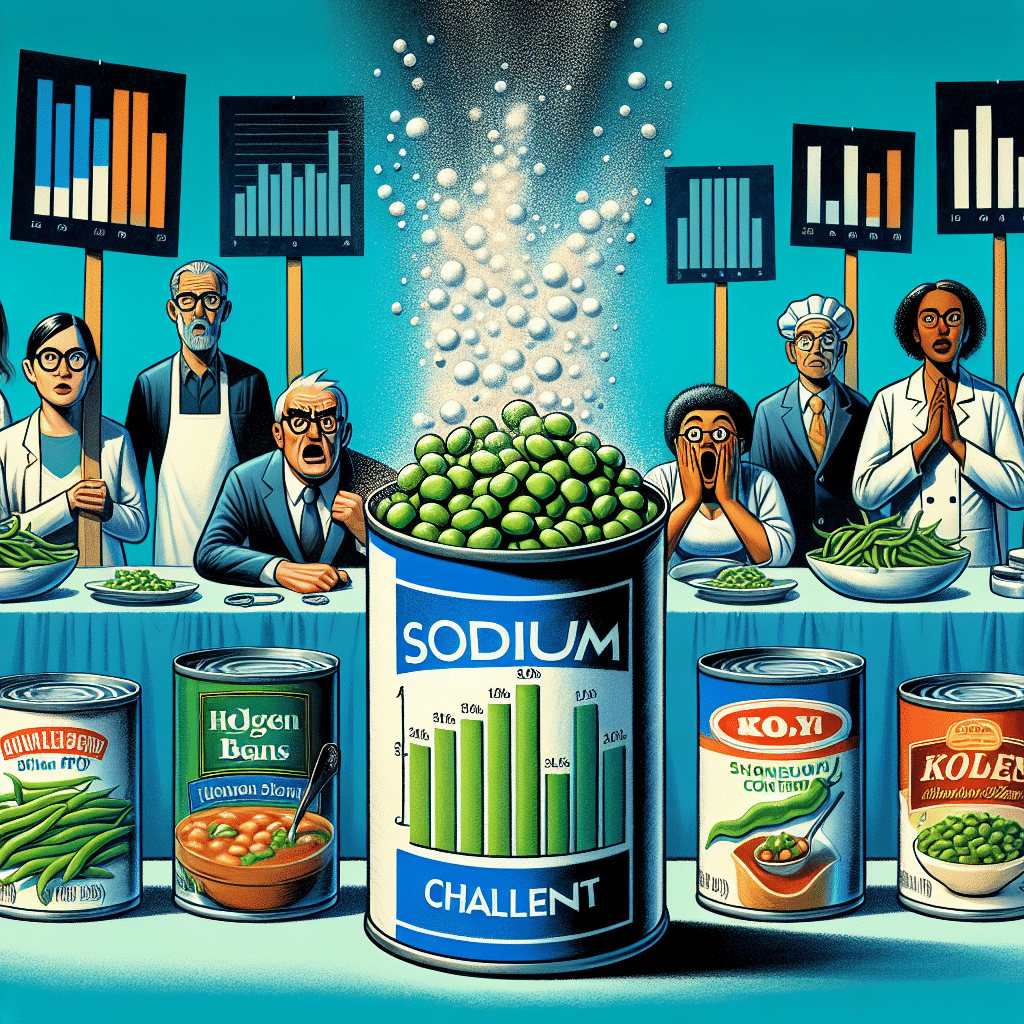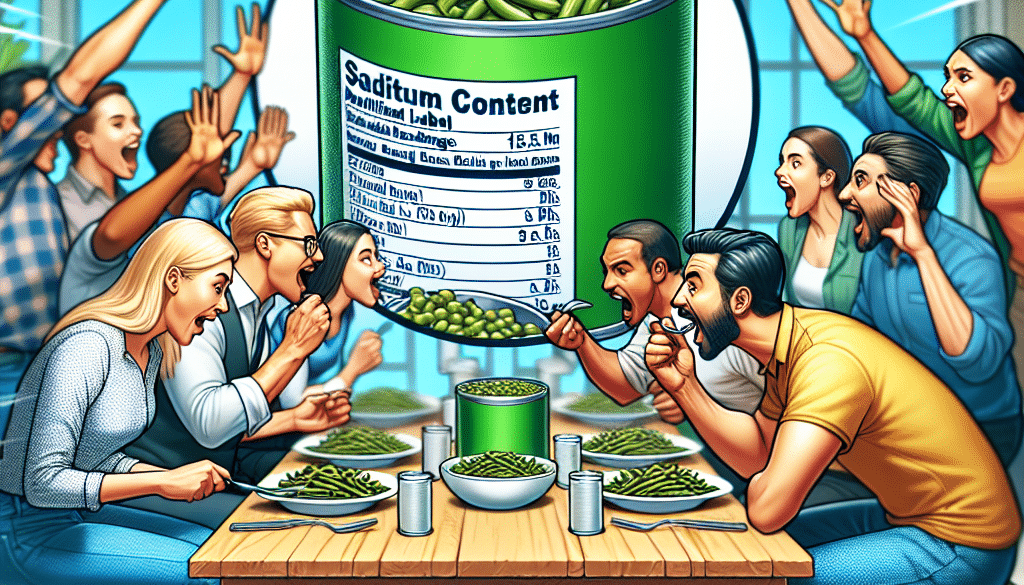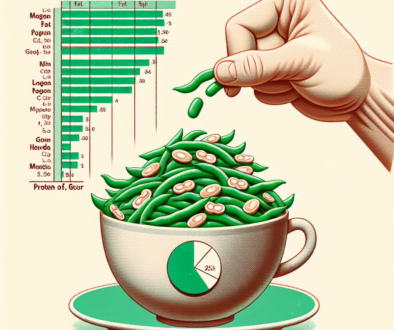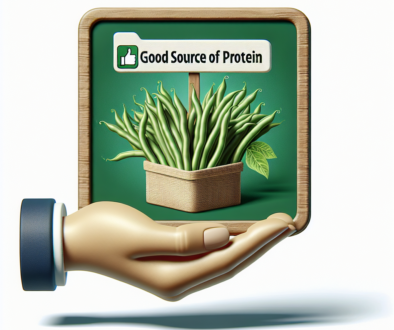The Sodium Content Challenge in Canned Green Beans
Table of Contents
- Sodium Content Challenge in Canned Green Beans: A Deep Dive
- Understanding Sodium in Our Diets
- The Sodium Content in Canned Green Beans
- Health Implications of High Sodium Intake
- Consumer Awareness and Demand for Low-Sodium Options
- Challenges Faced by the Food Industry
- Technological Innovations and Alternatives
- Case Studies and Success Stories
- Regulatory Measures and Labeling
- Preparing and Cooking with Canned Green Beans
- Conclusion: The Path Forward for Sodium Reduction
- ETprotein: Your Partner for High-Quality Protein Products
Sodium Content Challenge in Canned Green Beans: A Deep Dive

Green beans, a staple in many households, are often consumed for their nutritional benefits and convenience, especially when they come in canned form. However, the convenience of canned green beans comes with a hidden challenge: high sodium content. This article explores the implications of sodium in canned green beans, its impact on health, and the industry’s response to consumer demand for healthier options.
Understanding Sodium in Our Diets
Sodium is an essential mineral that plays a critical role in maintaining fluid balance and supporting nerve and muscle function in the human body. However, excessive sodium intake is a common dietary issue that can lead to various health problems, including hypertension, heart disease, and stroke.
The Sodium Content in Canned Green Beans
Canned green beans are often preserved using salt, which acts as a natural preservative. The sodium content in canned green beans can vary significantly depending on the brand and the processing method used. It’s not uncommon to find canned green beans with sodium levels ranging from 300 to 500 milligrams per half-cup serving, which is a substantial portion of the recommended daily limit of 2,300 milligrams for healthy adults.
Health Implications of High Sodium Intake
Consuming high amounts of sodium can have detrimental effects on health. It is associated with an increased risk of developing high blood pressure, which is a leading cause of cardiovascular diseases. The American Heart Association recommends no more than 2,300 milligrams a day and moving toward an ideal limit of no more than 1,500 mg per day for most adults.
Consumer Awareness and Demand for Low-Sodium Options
As awareness of the health risks associated with high sodium intake grows, consumers are increasingly seeking out low-sodium food options. This shift in consumer behavior has prompted food manufacturers to offer low-sodium or no-salt-added versions of canned green beans.
Challenges Faced by the Food Industry
The food industry faces several challenges when it comes to reducing sodium content in canned green beans without compromising taste, shelf-life, and safety. Salt not only enhances flavor but also inhibits the growth of bacteria, making it a crucial component in food preservation.
Technological Innovations and Alternatives
Food scientists are exploring various alternatives to salt, such as potassium chloride and natural flavor enhancers, to reduce sodium content while maintaining the desired taste and preservative qualities. Additionally, advancements in canning technology have allowed for better preservation methods that can help lower the need for added sodium.
Case Studies and Success Stories
Several brands have successfully launched low-sodium canned green beans that have been well-received by health-conscious consumers. These case studies highlight the potential for industry-wide change and the growing market for healthier canned food options.
Regulatory Measures and Labeling
Governments and health organizations worldwide are implementing measures to encourage food manufacturers to reduce sodium content in their products. Clear labeling of sodium content is also mandated in many regions to help consumers make informed choices.
Preparing and Cooking with Canned Green Beans
For those who prefer or need to use canned green beans, there are ways to reduce the sodium content before consumption, such as draining and rinsing the beans thoroughly. Additionally, incorporating fresh herbs and spices can enhance the flavor without the need for added salt.
Conclusion: The Path Forward for Sodium Reduction
The sodium content challenge in canned green beans is a complex issue that requires a multifaceted approach. It involves consumer education, industry innovation, and regulatory support to ensure that healthier options are available and accessible. By addressing this challenge, we can take a significant step towards improving public health and meeting the nutritional needs of consumers worldwide.
ETprotein: Your Partner for High-Quality Protein Products
While addressing the sodium content in canned green beans is crucial for a balanced diet, it’s also important to consider the role of protein in our daily nutrition. ETprotein offers a range of high-quality protein products that can complement a healthy diet, especially for those looking to increase their protein intake with plant-based options.
About ETprotein:
ETprotein, a reputable protein Chinese factory manufacturer and supplier, is renowned for producing, stocking, exporting, and delivering the highest quality organic bulk vegan protein and plant proteins. They include Organic rice protein, clear rice protein, pea protein, clear pea protein, pumpkin seed protein, sunflower seed protein, mung bean protein, etc. Their offerings, characterized by a neutral taste, non-GMO, allergen-free attributes, cater to a diverse range of industries. They serve nutraceutical, pharmaceutical, cosmeceutical, veterinary, as well as food and beverage finished product distributors, traders, and manufacturers across Europe, USA, Canada, Australia, Thailand, Japan, Korea, Brazil, and Chile, among others.
ETprotein specialization includes exporting and delivering tailor-made protein powder and finished nutritional supplements. Their extensive product range covers sectors like Food and Beverage, Sports Nutrition, Weight Management, Dietary Supplements, Health and Wellness Products, and Infant Formula, ensuring comprehensive solutions to meet all your protein needs.
As a trusted company by leading global food and beverage brands and Fortune 500 companies, ETprotein reinforces China’s reputation in the global arena. For more information or to sample their products, please contact them and email sales(at)ETprotein.com today.














